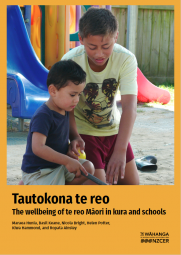
Celebrating and supporting te reo Māori revitalisation. Mahuru Māori, te wiki o Reo Māori.
Te Wāhanga
Ko Te Wāhanga, te rōpū rangahau Māori motuhake a Rangahau Mātauranga o Aotearoa, kua whakatūria i te ngahuru tau 1970.
Te Wāhanga, NZCER's dedicated Māori research unit, was created in the 1970s. Te Wāhanga
He rangahau
Seminal research—Survey of language use in Māori households and communities 1973-1978
In 1973 Dr Richard Benton began a sociolinguistic survey of te reo Māori that created a turning point in the fate of the language. The survey sought to answer two questions: who can speak Māori, and who does speak Māori? Over 30,000 people from nearly 6,500 whānau were surveyed.
The survey results became known as the Benton report, and continues to be a reference point for sociolinguistic researchers. Benton Survey of language use in Māori households and communities 1973-1978
He whāinga tōmua a te rautaki
Strategic priority: Improve education outcomes for every Māori learner.
We are committed to making a significant contribution to Māori education in ways that bring about positive change in policy and practice to benefit every Māori learner.
Find a long list of our research that supports Māori learners here.
He tangata
What can Pākehā learn from engaging in kaupapa Māori educational research?
What are the issues or benefits of Pākehā being involved in Māori-determined and controlled educational research?
The research offers critical insights that aim to counter 'Pākehā paralysis'. For Māori, this inquiry offers an account of how Pākehā are working with ‘our own’ in order to advance socially and culturally just research methodologies in education. What can Pākehā learn from engaging in kaupapa Māori educational research?
He rākau āwhina
Te Reo Māori: A language assessment tool
The NZCER Te Reo Māori assessment tool enables students to demonstrate their knowledge of te reo Māori vocabulary. It has been released as a resource for all learners in English-medium schools. The assessment is aligned with Levels 1–3 of The New Zealand Curriculum (NZC), focuses on the te reo Māori curriculum guidelines—Te Aho Arataki Marau mō Te Ako i Te Reo Māori, and draws on the Learning Languages area of NZC. Te Reo Māori: A language assessment tool
Taku Reo student survey
Taku Reo was developed in response to increasing use of te reo Māori in English-medium schools. The tool helps schools understand where students in Years 4–8 use te reo Māori and the students’ perceptions of the language. Taku Reo student survey
He rangahau
Our research
- Te Ahu o te Reo click here
- Tautokona te reo: The wellbeing of te reo Māori in kura and schools click here
- Ka whānau mai te reo: Kia rite! click here
- Ka whānau mai te reo: Honouring whānau, upholding te reo Māori click here
- Whatua tū aka is the TLRI kaupapa Māori research pathway click here
- Te reo Māori and school provisions for ākonga Māori – findings from the NZCER 2019 National survey of English-medium primary schools click here
He hautaka, he pukapuka hoki
Publications
- Kia Tangi Te Tītī - Permission to Speak click here
- He Kete Whakawaitara: He Whakatara ā-Rangahau click here
- Te Mauri o Te Whare. Winner, Te Reo Māori /Māori Language, Ngā Kupu Ora Aotearoa Māori Book Awards 2017 click here
- Toitū Te Whare. Finalist, Te Reo Māori /Māori Language, Ngā Kupu Ora Aotearoa Māori Book Awards 2016 click here
- Ka hoki tāua ki te whare huri ai ē!. Finalist, Te Reo Māori /Māori Language, Ngā Kupu Ora Aotearoa Māori Book Awards 2015 click here
- Kawea te wairua o te kupu click here
- Using pūrākau as a pedagogical strategy to explore Māori cultural identities click here
- Puna kōrero: Learning from the parents of Māori and Pasifika students click here




